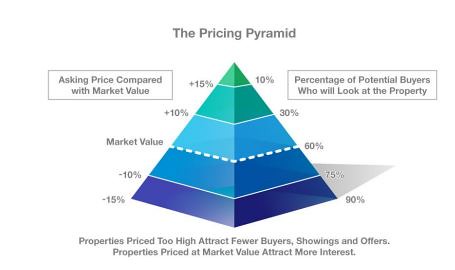Pricing for short term rentals

Pricing for sales, rentals and short term rentals all have the same thing in common: The market price depends on how many people are actively looking, and you can visualize that by imagining a pyramid, with the pointy tip being the multimillion dollar houses for sale or $1000/night short term rentals, and as the price gets lower the pyramid broadens out until you reach the base of the pyramid (see the above pic from the HAR website). The area of the pyramid at any price point represents the number of people that are a potential market for that property, as a general rule of thumb, the lower the price, there are more people interested in buying and capable of paying.
One can create a pyramid for any property type, such as 4 bedroom houses in Katy, TX, where if you price too high very few people even go see the property and you reduce the chance of getting an offer. The same thing applies for rentals and short term rentals, but with a difference: for short term rentals especially, the size of the pyramid changes during the year. For a beach condo in Florida during July, the pyramid is massive, there several hundred thousand people looking for a rental for July 4th weekend, if you price a condo very high there are still some people that will consider it. For months like September and October the price pyramids are smaller and shorter. There are fewer people looking, and the people that are won’t consider a more expensive place because there many possible options that are cheaper. (The same holds true for leases, but on a more muted scale because we are trying to get a long term renter, and once under contract they stay until the end of the lease, for short term rentals, if you miss a week that money is gone forever. There are still ups and downs in the leasing market, but it is expressed more in days on market increasing during slow months and decreasing during the summer.)
For short term rental websites such as VRBO and Airbnb, prospective clients can set a filter limiting how much they want to pay, if your property is above that limit you will be unseen and get few requests. (Similar to the MLS). For our short term rental I am guided by several rules:
- It’s better to get something than nothing for a week, as long as the price is above the operating cost and normal wear and tear, and the guests seem unlikely to damage the place.
- You can’t increase your price once negotiations start, start high for busy weeks, then if you have an empty week in June, decrease the price to fill it, but try to get as many peak weeks as possible at the best market price.
- Start lower for slower months to get people looking at the rental.
- Avoid renting to damaging guests, don’t rent for one night, don’t rent to people that say they are young but responsible. Screen the guests where possible by looking on social media, if they are funneling beer on their facebook page, I’d pass. (for leases, credit checks and references from previous landlords and background checks are key).
What is great about managing a short term rental is how quickly the market teaches you about pricing. Too high and all you hear are crickets. Too low and there is a constant stream of requests at a price you might not be happy about. For listings one can see how many showings you have, a rule of thumb is that no showings means you are at least 10% over priced, showings but no offers means you are around 5% over priced. The analytics from the web pages also give you some information, lots of hits on a listing tells you there are people searching. Reducing the price should increase the hits. If you have lots of hits, and lots of showings there could be something else wrong.
*the picture is from the HAR website's CMA program. All of the opinions here are just mine and are not from my broker or company. Always have a Realtor or property manager give you advice on properly pricing a property or short term rental.


